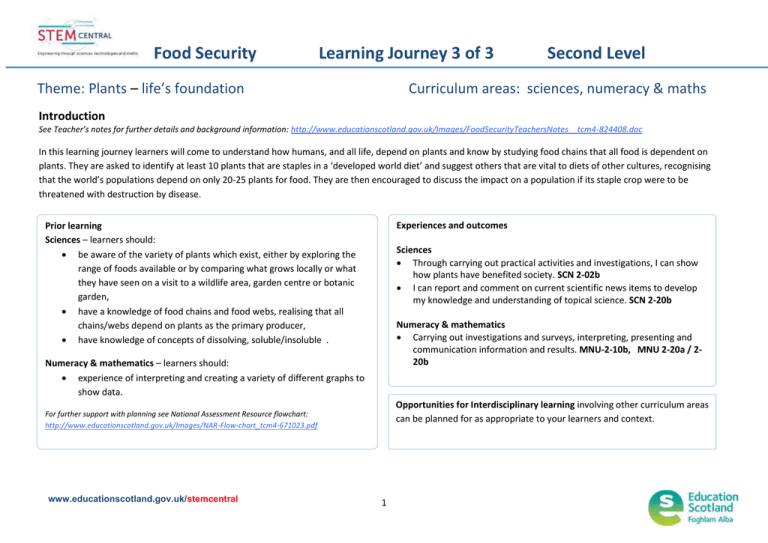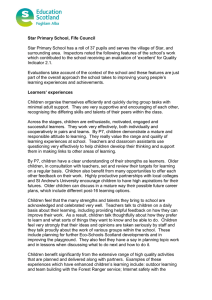Food Security ... Introduction
advertisement

Food Security Learning Journey 3 of 3 Theme: Plants – life’s foundation Second Level Curriculum areas: sciences, numeracy & maths Introduction See Teacher’s notes for further details and background information: http://www.educationscotland.gov.uk/Images/FoodSecurityTeachersNotes__tcm4-824408.doc v In this learning journey learners will come to understand how humans, and all life, depend on plants and know by studying food chains that all food is dependent on plants. They are asked to identify at least 10 plants that are staples in a ‘developed world diet’ and suggest others that are vital to diets of other cultures, recognising that the world’s populations depend on only 20-25 plants for food. They are then encouraged to discuss the impact on a population if its staple crop were to be threatened with destruction by disease. Experiences and outcomes Prior learning Sciences – learners should: be aware of the variety of plants which exist, either by exploring the range of foods available or by comparing what grows locally or what they have seen on a visit to a wildlife area, garden centre or botanic garden, have a knowledge of food chains and food webs, realising that all chains/webs depend on plants as the primary producer, have knowledge of concepts of dissolving, soluble/insoluble . Sciences Through carrying out practical activities and investigations, I can show how plants have benefited society. SCN 2-02b I can report and comment on current scientific news items to develop my knowledge and understanding of topical science. SCN 2-20b Numeracy & mathematics Carrying out investigations and surveys, interpreting, presenting and communication information and results. MNU-2-10b, MNU 2-20a / 220b Numeracy & mathematics – learners should: experience of interpreting and creating a variety of different graphs to show data. Opportunities for Interdisciplinary learning involving other curriculum areas can be planned for as appropriate to your learners and context. For further support with planning see National Assessment Resource flowchart: http://www.educationscotland.gov.uk/Images/NAR-Flow-chart_tcm4-671023.pdf www.educationscotland.gov.uk/stemcentral 1 Food Security Learning Journey 3 of 3 Second Level Stimulus Suggested key learning Learning activities Refer to Teacher’s notes. Learning intentions and success criteria should be established through dialogue with learners investigate labels on plant growth products e.g. Baby-bio, identify chemicals set up experiment to identify the most effective fertiliser test pH of different soil samples and identify best type for plant growth (http://bit.ly/1ekCa5Z), test plants for starch (http://bit.ly/KRVXBU) investigate and record findings (graphs) on a variety of plants found in the developed world diet, and other world diets- present findings detailing uses of plants, “Balloon debate” activity with choice being of preserving those plants they think are most important for providing food for the world’s growing population – see top 10 crops grown (http://binged.it/1aSZCq9). Does knowing more about each plant/product change how learners make decisions about them? investigate the amount of grain produced and fed to animals versus humans - Page 19 of Teacher’s notes, keep food diaries and use images of traditional diets from cultures around the world, discuss the source of these foods and collate information by creating frequency charts. Choose suitable graphs to identify the most important food sources. C Provide a selection of photos or magazines depicting scenes in a house. Using one or two photos, learners make a list of everything that would disappear from their picture if there were no plants. Have learners feed-back and discuss why they did or did not eliminate certain items. Practical investigation What do plants need for growth? Skills Through research activities and practical investigations learners will develop skills in: inquiry and investigation, observation and making predictions, analytical thinking when making sense of results, interpretation and evaluation of information, presentation and justification of their opinions, planning and organising. For more info on skills visit: Building the Curriculum 4 and Sciences Principles and Practice at Learners can: name chemicals used to aid plant growth, identify plants that are staples in a ‘developed world diet’ and suggest others that are vital to diets of other cultures, recognise that the world’s populations depend on only 20-25 plants for food, discuss the impact on a population if its staple crop were to be threatened with destruction by disease, understand the importance of biodiversity with reference to selected crops and the possible need to strengthen a crop weakened by disease, demonstrate findings using graphical representations, illustrate research findings through graphs, identify articles with relevant scientific information, extract viewpoints about food production and provision and compare articles, identify the link between food production/provision and biodiversity and sustainability. http://www.educationscotland.gov.uk/sciences www.educationscotland.gov.uk/stemcentral 2 Topical science issues should be included as appropriate. Food Security Reflecting on learning Dialogue with learners will establish how the design principles were addressed. Relate the prompts below to your own context. Breadth – What other curricular areas were covered during this topic? Can you relate learning to areas of real life and /or school learning? http://www.jou rneytoexcellence.org.uk /videos /netherlees cience.as p Personalisation and choice – Were you given the opportunity to choose your own methods of investigation or recording? Depth – Were you given the opportunity to show what you have learned and explain your learning to others? Have you led learning in any way? Coherence – Can you discuss some of the knowledge, understanding and skills you have developed? How have you used these? Can you relate them to real life or other areas of learning? Progression – Have you used the skills and knowledge and understanding you already had of the subject and have you built on these? Relevance – Can you identify an everyday context where you would use your knowledge, understanding and skills? Challenge & enjoyment – Did you enjoy the learning? Why/why not? Was it challenging enough? Can you suggest how to take learning further? Learning Journey 3 of 3 Second Level Evidence of learning Possible methods of assessment are listed below. Select as appropriate or devise your own. Say: Identify at least 10 plants that are staples in a ‘developed world diet’ and suggest others that are vital to diets of other cultures, recognising that the world’s populations depend on only 20-25 plants for food. Discuss the impact on a population if its staple crop were to be threatened with destruction by disease with reference to one or two specific crops. Write: Written report recognising the world’s dependence on relatively few crops, about how these crops are grown (most as monocultures) and what the consequences might be if any one of them were stricken with a disease. Make: Video/voice recording of learners’ debates. Justification of decisions made over which plants (given a list) should be preserved and which jettisoned if choices for future biodiversity had to be made. Do: Produce a compare & contrast graphic organiser, comparing diets of 2 or 3 families each from aTaking different cultural background. learning further Findmore ways information to deepen andsee: extend learningprogress through dialogue with learners. For Assessing and achievement resource at http://www.educationscotland.gov.uk/sciences Challenge the school community to turn an area of the school garden into a vegetable patch and uses what is produced in the school kitchen. http://www.journeytoexcellence.org.uk/videos/netherleescience.asp Study foods from different countries and cultures and draw graphs showing most commonly eaten crops. Use information to discuss /debate food choice and reasons for choices. See the Sciences Concept Development Paper for more guidance: http://www.educationscotland.gov.uk/sciences www.educationscotland.gov.uk/stemcentral 3




